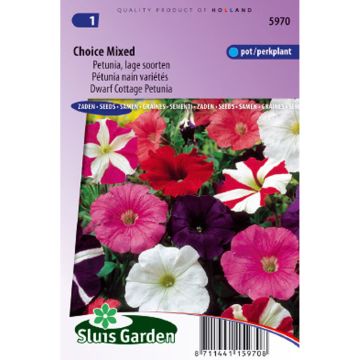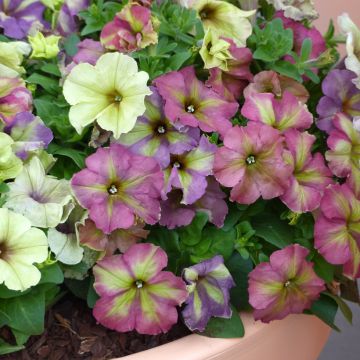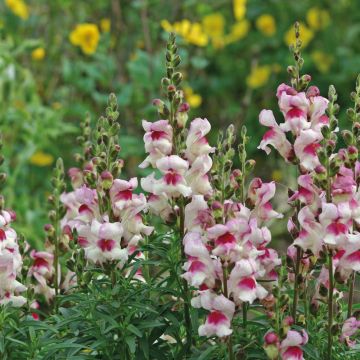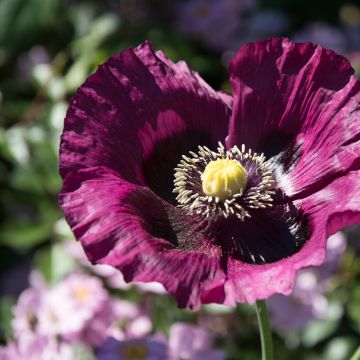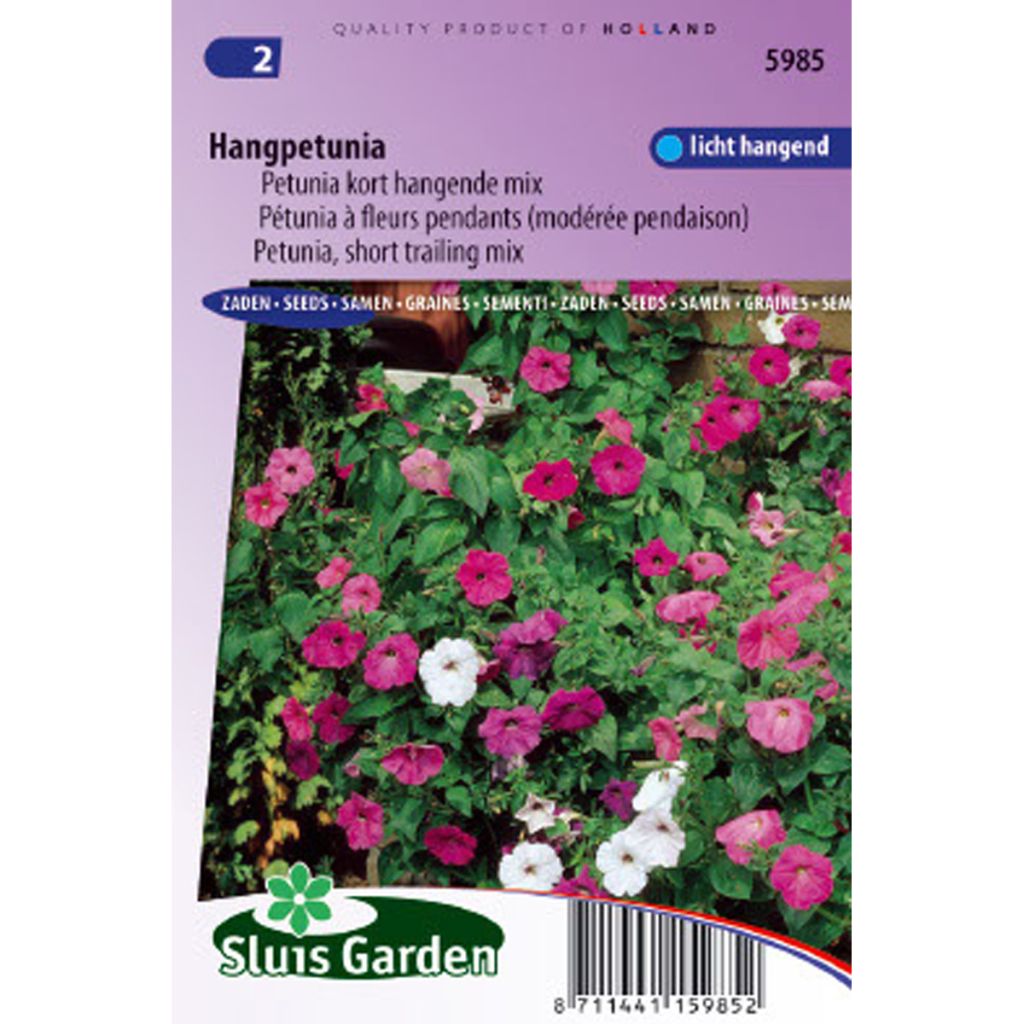

Trailing Petunia Balcony Mix Seeds - Petunia x hybrida pendula
Trailing Petunia Balcony Mix Seeds - Petunia x hybrida pendula
Petunia x hybrida pendula Balcony Mix
Petunia
I have been sowing this variety for years and I am never disappointed! The young plants are resilient and can reach a certain length if planted close together in the planter.
Aurélie, 22/01/2021
Special offer!
Receive a €20 voucher for any order over €90 (excluding delivery costs, credit notes, and plastic-free options)!
1- Add your favorite plants to your cart.
2- Once you have reached €90, confirm your order (you can even choose the delivery date!).
3- As soon as your order is shipped, you will receive an email containing your voucher code, valid for 3 months (90 days).
Your voucher is unique and can only be used once, for any order with a minimum value of €20, excluding delivery costs.
Can be combined with other current offers, non-divisible and non-refundable.
Home or relay delivery (depending on size and destination)
Schedule delivery date,
and select date in basket
This plant carries a 6 months recovery warranty
More information
We guarantee the quality of our plants for a full growing cycle, and will replace at our expense any plant that fails to recover under normal climatic and planting conditions.

Would this plant suit my garden?
Set up your Plantfit profile →
Description
This mix of trailing petunias also known as Petunia x hybrida pendula Balcony Mix, features simple, abundant, funnel-shaped flowers in shades of white, red, pink and lilac, from June to the first frosts. Their growth habit is slightly cascading. This old and somewhat out of fashion variety is easy to grow and was a star in the last century because of its deliciously fragrant flowers with much old-world charm. These annuals are perfect for adding colour and fragrance to window-boxes, pots and hanging baskets.
Hybrid petunias are all derived from several plants originating from the warmer regions of South America. Older varieties were bred from white-flowered Petunia axillaris and purple-flowered Petunia integrifolia, Today, hybrids of all colours except orange, can be found. Petunia x hybrida pendula Balcony Mix belongs to the Solanaceae family and is close to ornamental tobacco for example. Its foliage also contains alkaloids. The plants from this variety form in record time, loose clumps with a slightly cascading growth habit, that reach 35 cm in height and 30 cm in diameter. The plant is in bloom from June to the first frosts, provided that the wilted flowers are regularly removed and that fertilizer is regularly applied. Its cupped flowers are pleasantly scented, medium-sized (3 to 5 cm in diameter) and come in a range of white to red shades, including lilac. The little centre of the corolla is black. The vigorous and healthy foliage is dark green, fairly pubescent and features entire margins.
No other flowering annual has been the subject of such advanced selection by plant breeders and for such a long period of time. The results, such as demonstrated by the Balcony Mix variety, are impressive since the splendour of their blooms and length of their flowering period rival those of pelargoniums. Plant them in large pots or in hanging baskets. You can also plant them in flowerbeds, using them to punctuate borders with plants featuring grey foliage, such as mouse-ears, silver ragwort or sagebrush.
Warning: seeds are best meant for very experienced gardeners who are used to sowing very fine seeds. These seeds are as fine as dust and are hardly visible to the naked eye.
Report an error about the product description
Flowering
Foliage
Plant habit
Botanical data
Petunia
x hybrida pendula
Balcony Mix
Solanaceae
Petunia
Cultivar or hybrid
Other Petunia seeds
View all →Planting and care
Sow petunia seeds from late winter to mid-spring in a seed tray at 21-27 °C. Spread the seeds on the surface of a good quality, special seed starting mix, enriched with well-rotted compost. You can mix the seeds with sand or light soil to help you sow thinly. Do not cover the seeds but press them gently into the growing medium so that the seeds adhere to the surface. Keep the soil moist but not soggy. Keep in well-lit conditions, in a transparent, waterproof plastic bag. Germination usually takes 10 to 21 days. When the seedlings are large enough to be handled, plant them out in pots and let them grow in cooler conditions. Gradually acclimatize them to outdoor conditions for 10 to 15 days and then, when all risk of frost has passed, plant the seedlings outdoors, in a sunny spot sheltered from strong winds, in well-drained soil. For cultivation in pots, prick the seedlings out into 7.5 cm diameter pots and place them in a cool, well-ventilated spot in a bright position, without direct sunlight.
Sowing period
Intended location
-
, onOrder confirmed
Reply from on Promesse de fleurs
Similar products
Haven't found what you were looking for?
Hardiness is the lowest winter temperature a plant can endure without suffering serious damage or even dying. However, hardiness is affected by location (a sheltered area, such as a patio), protection (winter cover) and soil type (hardiness is improved by well-drained soil).

Photo Sharing Terms & Conditions
In order to encourage gardeners to interact and share their experiences, Promesse de fleurs offers various media enabling content to be uploaded onto its Site - in particular via the ‘Photo sharing’ module.
The User agrees to refrain from:
- Posting any content that is illegal, prejudicial, insulting, racist, inciteful to hatred, revisionist, contrary to public decency, that infringes on privacy or on the privacy rights of third parties, in particular the publicity rights of persons and goods, intellectual property rights, or the right to privacy.
- Submitting content on behalf of a third party;
- Impersonate the identity of a third party and/or publish any personal information about a third party;
In general, the User undertakes to refrain from any unethical behaviour.
All Content (in particular text, comments, files, images, photos, videos, creative works, etc.), which may be subject to property or intellectual property rights, image or other private rights, shall remain the property of the User, subject to the limited rights granted by the terms of the licence granted by Promesse de fleurs as stated below. Users are at liberty to publish or not to publish such Content on the Site, notably via the ‘Photo Sharing’ facility, and accept that this Content shall be made public and freely accessible, notably on the Internet.
Users further acknowledge, undertake to have ,and guarantee that they hold all necessary rights and permissions to publish such material on the Site, in particular with regard to the legislation in force pertaining to any privacy, property, intellectual property, image, or contractual rights, or rights of any other nature. By publishing such Content on the Site, Users acknowledge accepting full liability as publishers of the Content within the meaning of the law, and grant Promesse de fleurs, free of charge, an inclusive, worldwide licence for the said Content for the entire duration of its publication, including all reproduction, representation, up/downloading, displaying, performing, transmission, and storage rights.
Users also grant permission for their name to be linked to the Content and accept that this link may not always be made available.
By engaging in posting material, Users consent to their Content becoming automatically accessible on the Internet, in particular on other sites and/or blogs and/or web pages of the Promesse de fleurs site, including in particular social pages and the Promesse de fleurs catalogue.
Users may secure the removal of entrusted content free of charge by issuing a simple request via our contact form.
The flowering period indicated on our website applies to countries and regions located in USDA zone 8 (France, the United Kingdom, Ireland, the Netherlands, etc.)
It will vary according to where you live:
- In zones 9 to 10 (Italy, Spain, Greece, etc.), flowering will occur about 2 to 4 weeks earlier.
- In zones 6 to 7 (Germany, Poland, Slovenia, and lower mountainous regions), flowering will be delayed by 2 to 3 weeks.
- In zone 5 (Central Europe, Scandinavia), blooming will be delayed by 3 to 5 weeks.
In temperate climates, pruning of spring-flowering shrubs (forsythia, spireas, etc.) should be done just after flowering.
Pruning of summer-flowering shrubs (Indian Lilac, Perovskia, etc.) can be done in winter or spring.
In cold regions as well as with frost-sensitive plants, avoid pruning too early when severe frosts may still occur.
The planting period indicated on our website applies to countries and regions located in USDA zone 8 (France, United Kingdom, Ireland, Netherlands).
It will vary according to where you live:
- In Mediterranean zones (Marseille, Madrid, Milan, etc.), autumn and winter are the best planting periods.
- In continental zones (Strasbourg, Munich, Vienna, etc.), delay planting by 2 to 3 weeks in spring and bring it forward by 2 to 4 weeks in autumn.
- In mountainous regions (the Alps, Pyrenees, Carpathians, etc.), it is best to plant in late spring (May-June) or late summer (August-September).
The harvesting period indicated on our website applies to countries and regions in USDA zone 8 (France, England, Ireland, the Netherlands).
In colder areas (Scandinavia, Poland, Austria...) fruit and vegetable harvests are likely to be delayed by 3-4 weeks.
In warmer areas (Italy, Spain, Greece, etc.), harvesting will probably take place earlier, depending on weather conditions.
The sowing periods indicated on our website apply to countries and regions within USDA Zone 8 (France, UK, Ireland, Netherlands).
In colder areas (Scandinavia, Poland, Austria...), delay any outdoor sowing by 3-4 weeks, or sow under glass.
In warmer climes (Italy, Spain, Greece, etc.), bring outdoor sowing forward by a few weeks.
































